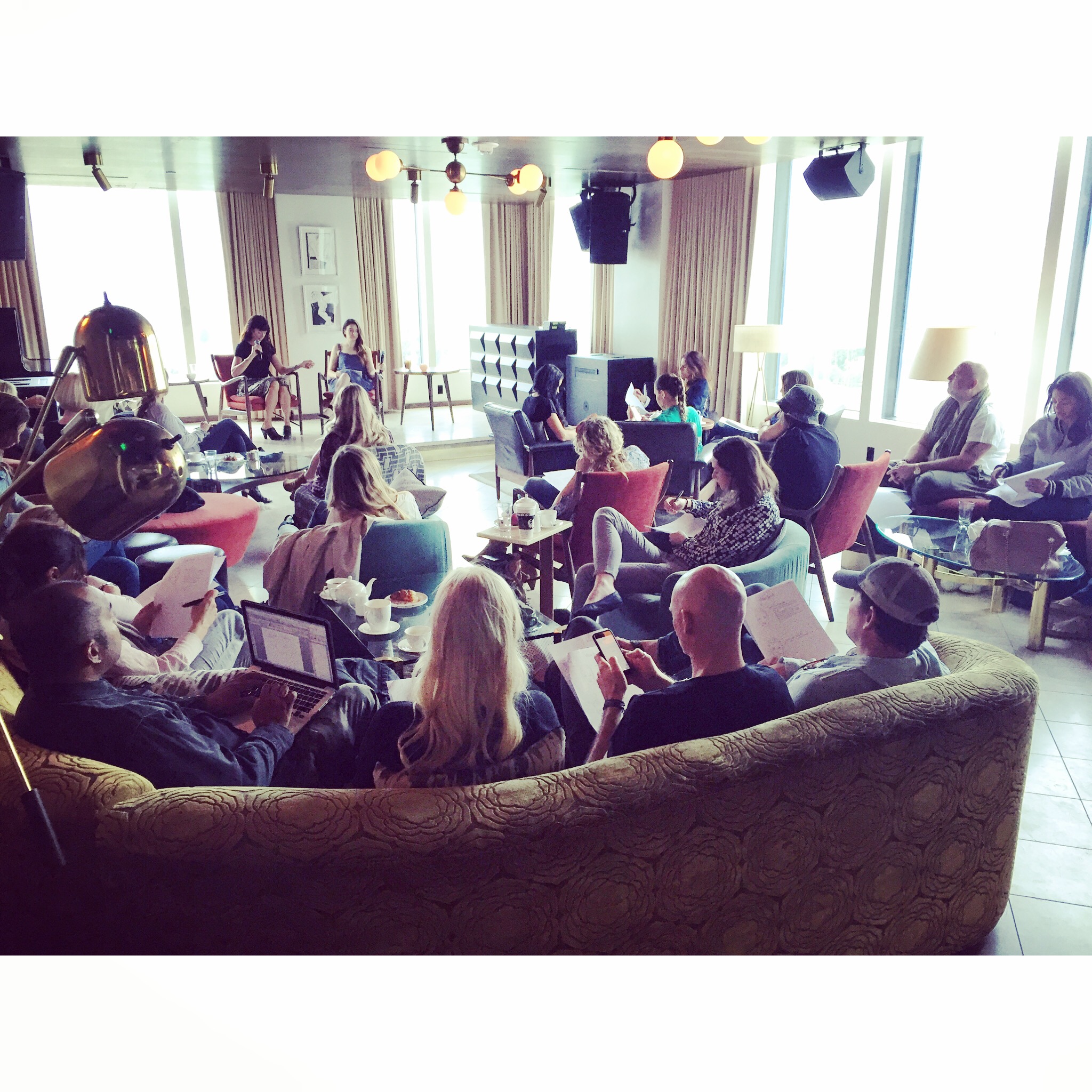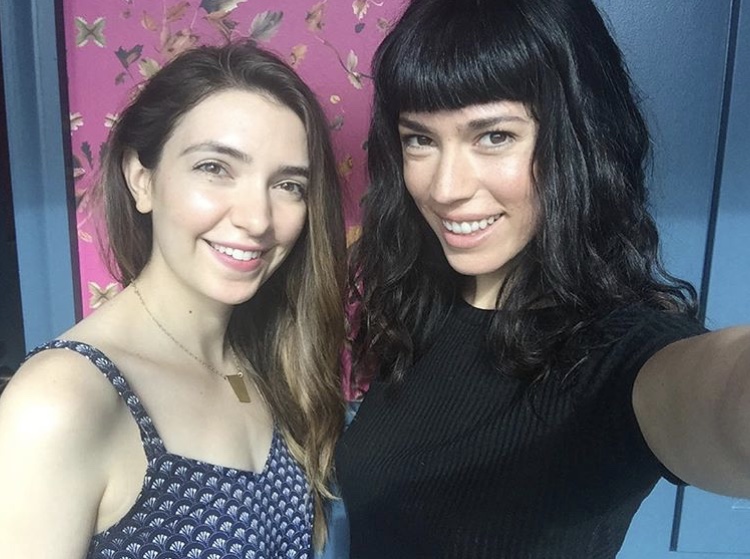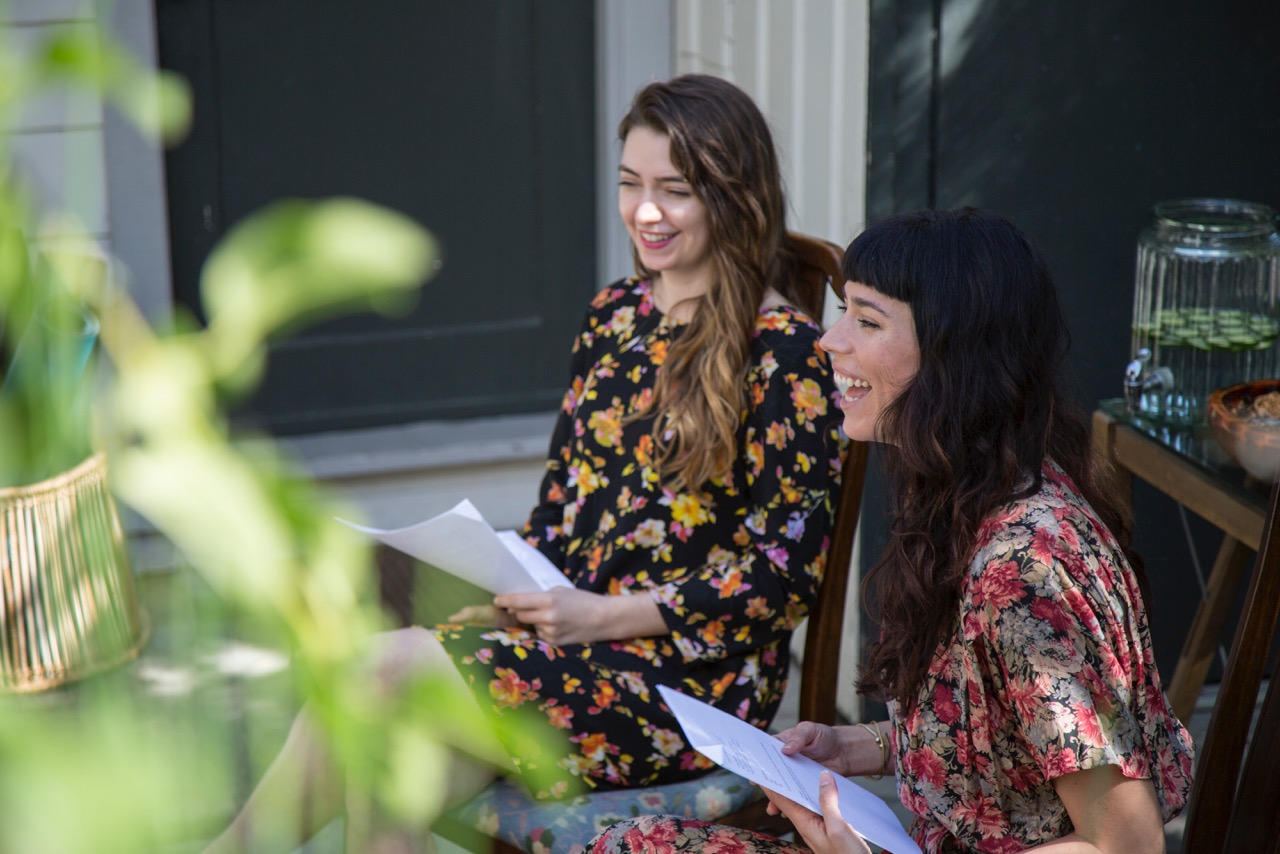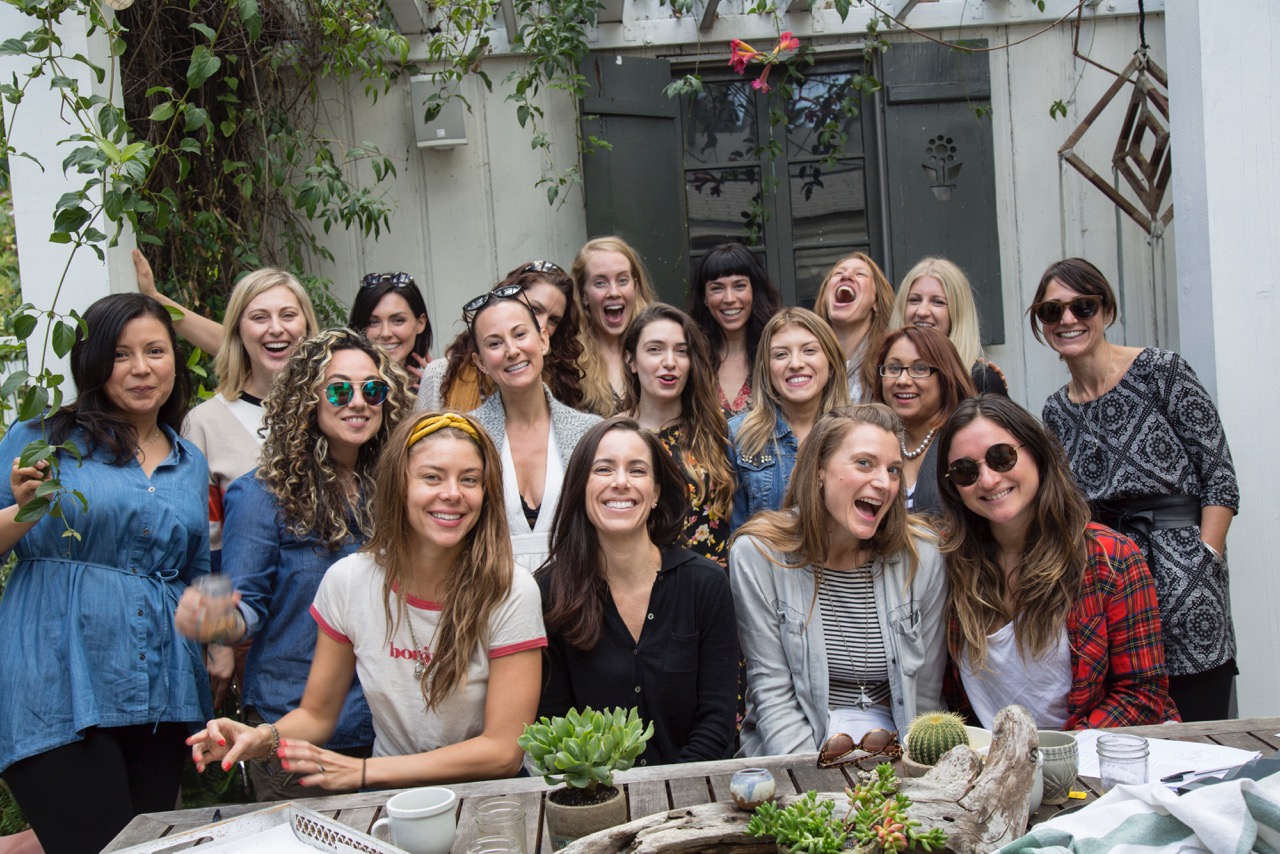
A few weeks ago, I attended an event at Soho House called SKIN FOOD, hosted by therapeutic skin coach Hayley Roy and health coach Tara Curran. I am a product junkie when it comes to skincare (and a junk food junkie when it comes to nutrition), so my skin tends to be all over the place. I SO loved their advice on approaching skincare from a natural and holistic perspective, focusing more on what you’re putting into your body as opposed to dealing with the damage after the fact, that I asked them to jump on Heels in the Hills to share their knowledge and hot tips for glowing, healthy skin…
I saw you two speak at Soho House, and am so excited to introduce you to my readers! Can you share your backstory a bit, who you are and what you do?
H- My backstory begins when I was a young girl and was constantly dealing with being sick and having a horrible case of acne from 10-21 years old. I became an esthetician in Milwaukee, Wisconsin at the Institute of Beauty and Wellness back in 2006, I was drawn to this profession because I became obsessed with problem solving and I love helping people. I’ve worked in many spas, skin care boutiques and under plastic surgeons to help shape my craft. I started working from home a year ago while taking a little break to recover from a stress related shingles outbreak that started to shut down my nervous system. I met Tara around this time and she helped me get better through foods and self care. Having the time to reflect on what I truly wanted out of my skincare career, I knew it was time to work for myself and that’s when therapeutic skin coaching was born. My practice is about using my holistic health background to help skin conditions from the inside out. This was such a great segway into SKIN FOOD because skin is a reflection of your health, and Tara and I really wanted to be able to present our information in an attainable way.
T- I started to get into nutrition to help fix my own skin and health issues as well as some family members. Illness runs deep in my family and I felt, and still feel strongly, that food can heal and be the best medicine. So after seeing results in my own health through changes in my diet, I decided to go to school and study this thought and feeling deeper. I began a health coaching practice in NYC in 2011 and it’s been the best decision yet. I’ve been in LA three years now, am registered with the drugless practitioners of America and have found my niche in one-on-one health coaching, speaking engagements between NYC and LA and curating wellness programs/events for hotels such as The Surf Lodge, in Montauk, NY.

{Speaking at Soho House}
What I loved about your talk was how focused you were on taking care of your skin and body from what you eat, as opposed to advocating expensive fancy creams and serums with ingredients I can’t pronounce. What are the best things to eat? And the worst?
H- Absolutely, many times when I was working in a corporate spa I would be required to make expensive product recommendations. It didn’t feel authentic to me when the client was clearly dealing with an internal issue. It felt like putting a band aid on a problem instead of providing the guidance these people were seeking from me. My recommendation post-facial is usually a green smoothie and avoiding inflammatory foods/drinks such as sugar, coffee and alcohol.
T- I really believe in food as the best medicine for anything. Nutrient dense, real, whole foods are my go-to’s, and starting a food journal to see if any certain foods trigger reactions and/or blemishes on the face. It’s also important to avoid food that comes in a package and refined sugar.

Short of going raw vegan and sugar-free, what advice do you have on making balanced nutritional choices without giving everything up? (This coming from a girl for whom frosting is a food group, and cheese fries a vegetable.)
H- This is such a good question. I always thought that there would only be one right way to eat and you have to stay strict to that. The truth is, everyone is different and we have to be able to determine what works best for us. There are always those “treat days,” too, that we as humans need – the key is to be able to balance that out with proper care. If I have a heavy meal or a late night meal I make sure to add in some digestive enzymes to help my body break it down. This is what works for me so I honor that about myself and try not to stress about it.
T- Going raw or vegan is definitely not for everyone and we all need to find our own balance for successful health. I like to suggest to clients to shop at farmers markets so you can eat seasonally, find time each week to meal prep a few days in advance and always listen to your body. When you have cravings, make sure you’re not just needing more water or look for real whole foods that are naturally sweet like sweet potato or beets, and if you crave salty look for something like hummus or seaweed snacks. Please by all means indulge when you feel you should, we should never feel deprived of something. Mindful eating is the best tool and following a rule where your diet is full of eating what feels best in your body and gives you energy, then an indulgence in something that is a little off your diet – you will be okay.
Can you talk a bit about the benefits of supplements? What are some that you recommend? How about vitamins?
H- I personally have struggled with gut issues my whole life. Adding in probiotics and adaptogens was game changing for me in order to rebuild my natural bacteria, and was the first step into healing my other ailments (including the acne I had for over 11 years). I’d love to think that we can get everything out of our foods but sometimes there are things that set us back in our health that supplements can help rebuild. I also usually seek guidance for this as I don’t want to overdo it or use supplements that are not suited for me. My go-to’s are obviously Tara and my acupuncturist. Since they have my whole health history, I appreciate their honesty in terms of what I need and what may not be necessary.
T- I highly recommend probiotics. They help build healthy gut flora which in turn helps keep your immune system up and toxins properly reduced. Supplements are different for everyone so I think it’s important to work with a nutritionist and/or doctor to decide what else may be needed. Adaptogens like Chlorella or Spirulina, Ashwagandha and more are great additions to your repertoire for preventative health. They can help keep the body in harmony and reduce the effects of stress and so much more. There are also a few really beautiful brands packaging adaptogens to make it easy for you to purchase and add into your daily smoothies, juice, tea or water!

You also spoke about how to tell if your skin is environmentally or hormonally affected, and if you have an imbalanced gut. Can you elaborate on this, and explain how to tell which category you fall into and what steps to take to address them? (I, for example, think I’m hormonally affected because I get gross cystic acne on my chin and forehead, and have perpetual dark circles under my eyes. Help!)
H- As a facialist, the number one issue I encounter is misdiagnosing the skin. We’ve been taught that certain skin conditions are only rooted to one source, but that’s not entirely true. Having a guide to help determine whether or not your skin is affected by the environment, your hormones, your digestion or all of the above is essential to making the necessary changes to benefit your health. When you are dealing with certain issues and not understanding why or how it is occurring, then journalling your symptoms will become eye-opening for you. Let’s say your skin only breaks out once a month while you have a craving for sugar right before your period, you can easily correlate that to a hormonal imbalance. If you travel a lot and get irritated skin, you may be an environmentally affected skin type. The list of connections go on and on. Try to become your own skin detective and you will be surprised with what you come up with.
Going back to expensive fancy creams and serums, there are 10 million and 1 products out there – the mere options are overwhelming! What products do you like? What ingredients should we look for? Or avoid?
H- I think less is more. Your skin has the ability to heal itself so it is important to give it the chance to work its magic. I love oils! Oils to skin care are what fats are to nutrition, they get a bad reputation but they are game changing! Some personal favorites are Rosehip oil by PAI, they use more than just the seed so it is filled with tons of vitamin c, vitamin a and omegas 3, 6 , 7 and 9! Kahina Giving Beauty’s Argan Oil because it’s great for any skin type and part of the proceeds are donated to the women’s cooperative in Morocco that hand-press this precious oil to perfection! Then there is Vintner’s Daughter, which has 22 different botanicals and essential oils to bring you the best natural blend I have ever used. It’s divine. As far as ingredients to avoid, I like to use the THINK DIRTY app or log into EWG.org if I am not sure of the source of an ingredient. Avoiding parabens, phenoxyethanol and any petrochemicals is a great start. Anything that isn’t fair trade, ethically sourced and animal friendly is a no-go in my book.

Even though you approach skincare without relying on chemicals, you do use LED light therapy, micro current, high frequency, ultrasonic cleansing and other high tech methods of taking care of your skin. Can you explain the benefits of this, and how they work in tandem with nutrition?
H- This is definitely stemming from my medical background. I used to love the gadgets I’d get to use in a medical office, but truly hated the chemically-based skin care. In order to enhance the efficacy of a product, I love to use different modalities so the skin is ready to receive it. Besides that, things like LED light can communicate to cells deeper than any skincare could without compromising the integrity of the skin. I like to be effective yet delicate. The key is reducing inflammation yet still generating a great result. Like any other organ, you can’t just exercise without providing the right nutrition to fuel your body. It’s the same way with skin, we can use all the fancy tools and really work out the organ, but the key to success is a nutritionally beneficial diet.
Let’s wrap it up with some final words. People, I say slather yourself in SPF every day before you let the sun near your body! Hayley and Tara, do you have any last bits of advice to keep us young, healthy, lean and mean in 2016 and beyond?
H- Self care is key! Prioritizing yourself is not selfish, it’s a necessary part of your well being. Make that time for your facials, massages, yoga classes etc. It is always worth it!
T- I concur Hayley! Self care and being more mindful of what our bodies need. Tune in and be patient with yourself, find some time to treat yourself to facials and massages, eat clean real whole foods and indulge when you know you deserve it!

Follow Hayley and learn more about her therapeutic skin coaching here. Follow Tara and learn more about her health coaching here. If you live in Los Angeles, check out their workshop at Wanderlust tonight!











Comments are closed here.